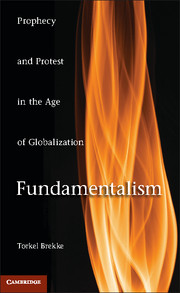Book contents
- Frontmatter
- Contents
- Acknowledgments
- Introduction
- Part I The Historical and Ideological Context of Fundamentalism
- Part II Fundamentalist Struggles
- 5 The Struggle for the State
- 6 The Struggle over Law
- 7 The Struggle for the Sciences
- 8 The Struggle over Education
- 9 The Struggle over Women
- Conclusion
- Bibliography
- Index
8 - The Struggle over Education
from Part II - Fundamentalist Struggles
Published online by Cambridge University Press: 05 June 2012
- Frontmatter
- Contents
- Acknowledgments
- Introduction
- Part I The Historical and Ideological Context of Fundamentalism
- Part II Fundamentalist Struggles
- 5 The Struggle for the State
- 6 The Struggle over Law
- 7 The Struggle for the Sciences
- 8 The Struggle over Education
- 9 The Struggle over Women
- Conclusion
- Bibliography
- Index
Summary
In premodern society, schools were almost always religious institutions. The development of modern education is closely connected to the development of fundamentalism in all the world religions. The differentiation of education and the development of a broad-ranging secular educational system are key components of modernity. Modern public education is generally organized according to an ideology of secularism, which means that the methods of teaching and the curricula assume that religion can be clearly separated from other secular subjects, such as science, history, and languages. It does not mean that the teaching of religion is banned from schools, but it does mean that religion is taught as a delimited subject with no implication for the teaching of other subjects. So differentiation in society at large is replicated in the modern educational systems of most modern states.
For this reason, fundamentalists see schools as an important arena for a struggle against a hostile worldview comprising humanism, secularism, and modernism. They believe that it is a grave problem that religion has this delimited status and position in public schools, and there are several ways to approach this problem. On the one hand, fundamentalists often struggle to change teaching and curricula. Some of the most important Supreme Court cases about the status of religion in American society are about the place of religion in schools, and there are similar battles for the minds of children in other societies. On the other hand, fundamentalists may try to take the education of their children out of the hands of the state. They may argue that education of children is a private matter and that the public authorities should have nothing, or very little, to say about what parents teach their children. This is the strategy chosen by the homeschool movement in the United States, and it is the ideology behind some of the religious schools that we find in Muslim or Hindu societies.
- Type
- Chapter
- Information
- FundamentalismProphecy and Protest in an Age of Globalization, pp. 212 - 236Publisher: Cambridge University PressPrint publication year: 2011



